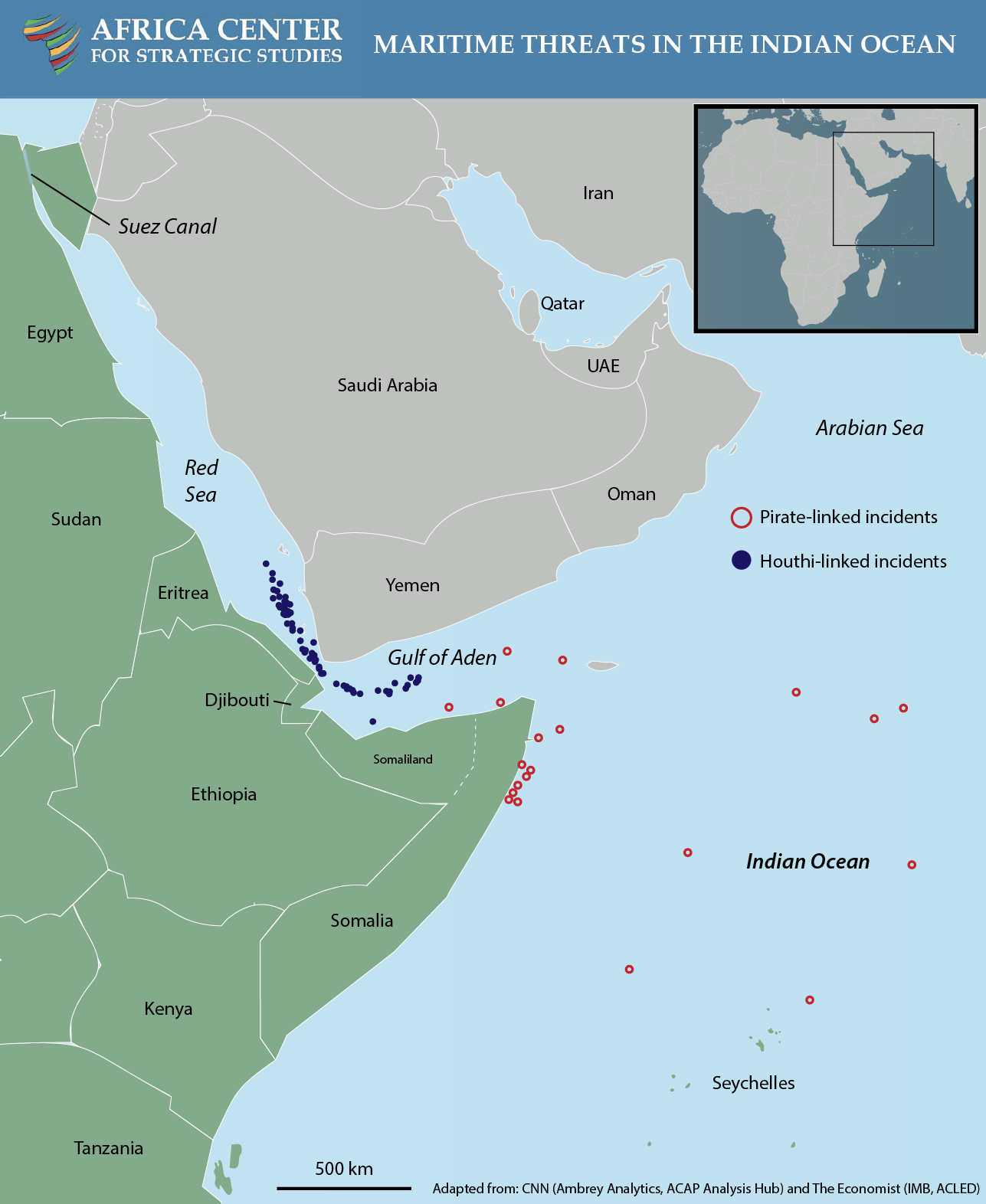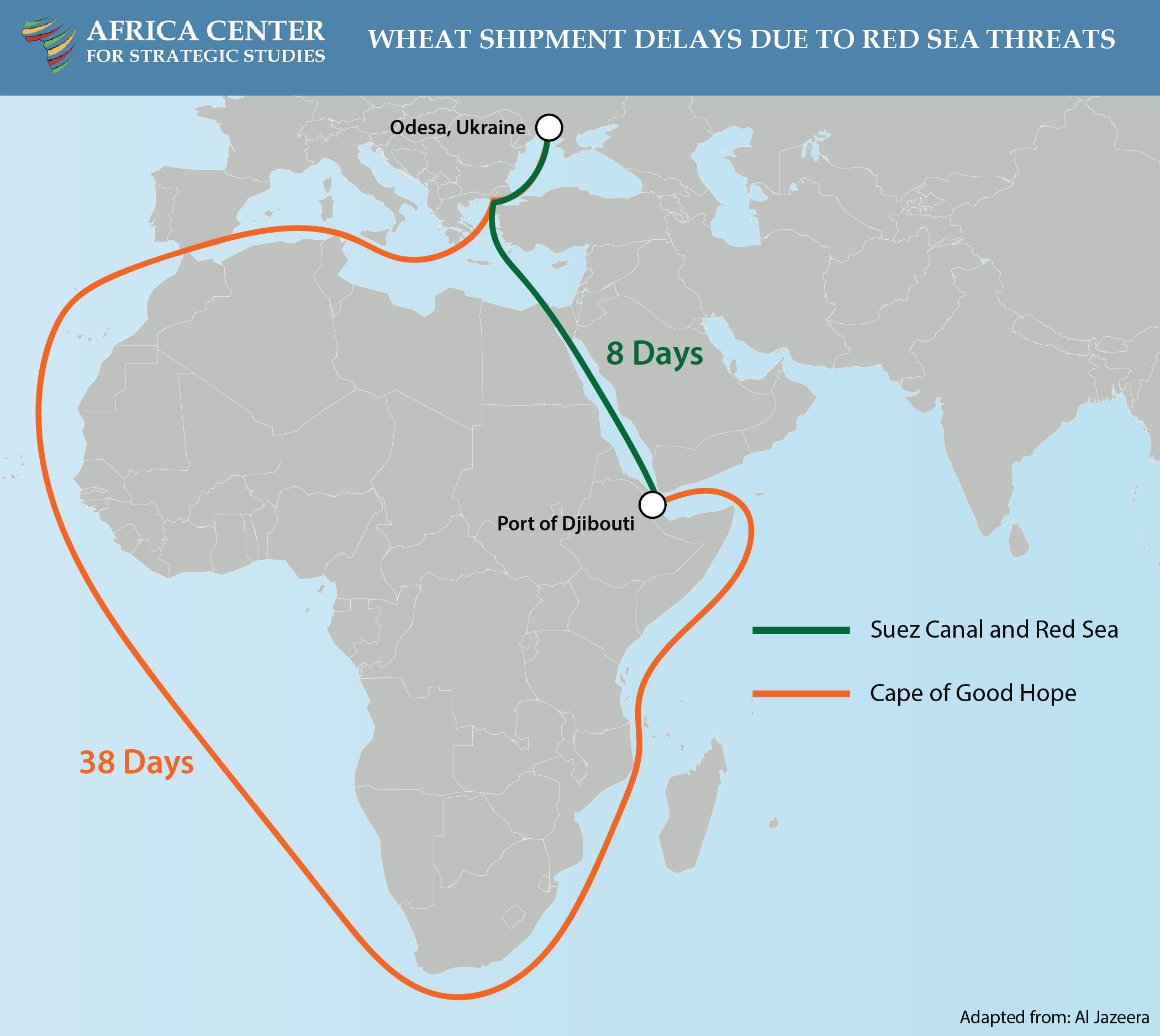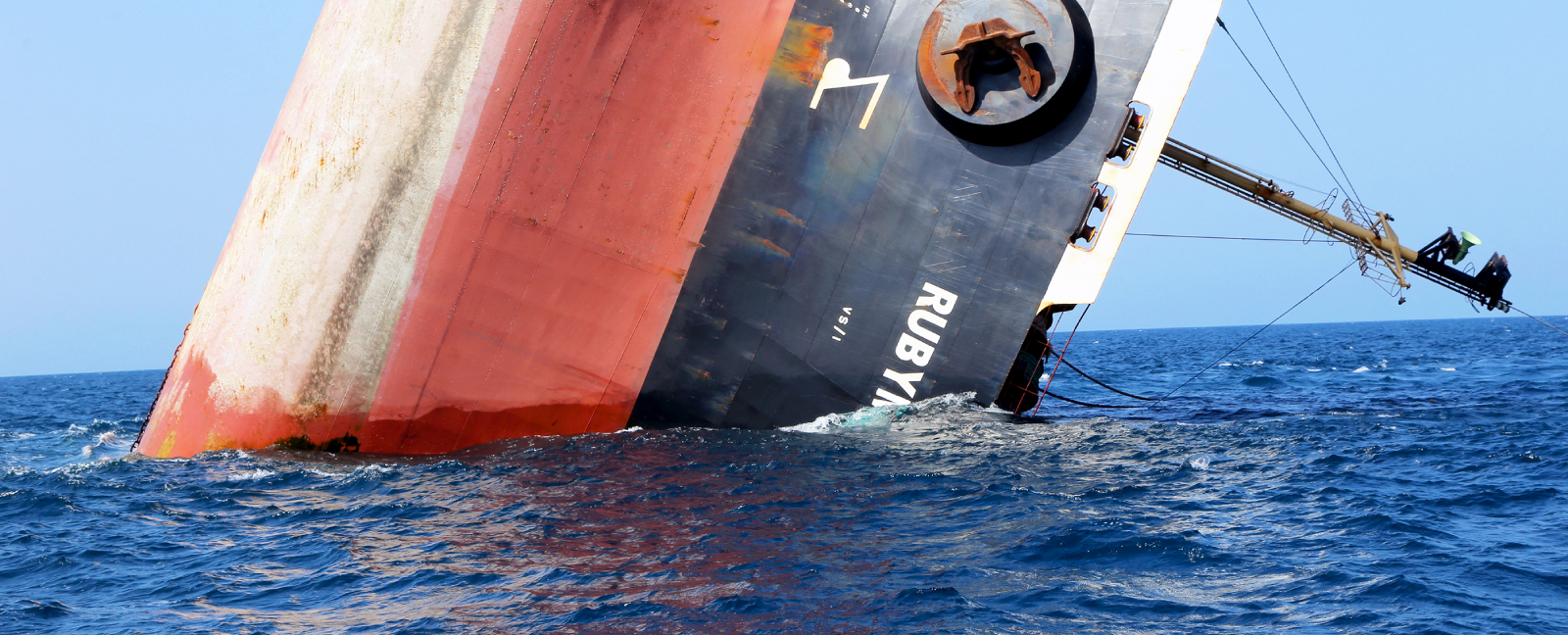
The shipping vessel Rubymar capsizing in the Red Sea after a Houthi missile attack. (Photo: AFP/Khaled Ziad)
Attacks on shipping in the Red Sea by the Houthi militia in Yemen have exposed the vulnerability of African maritime security. Since November 2023, there have been 133 reported incidents, including 14 vessels struck by missiles or drones and 18 vessels hijacked by Somali pirates. The disruptions caused by nonstate actors unbounded by international law and with access to stocks of standoff armaments pose fundamental challenges to Africa’s security and economic development.
The Houthis further threatened to disrupt the 20 submarine cables providing subsea communication networks around the Red Sea. Shortly thereafter, a vessel carrying 21,000 metric tons of ammonium phosphate sulfate fertilizer, the Rubymar, was struck by a Houthi missile and began sinking. Its dragging anchor is believed to have damaged three subsea cables.
The attacks have convulsed shipping from the Red Sea through the Gulf of Aden to the Western Indian Ocean, through which 25 percent of global shipping traffic flows. The repercussions have been immediately visible.
African citizens are paying the price of delays, more expensive consumer goods, disruption to local economic entities, and polluted waterways.
Global shipping companies have diverted routes away from the Red Sea, altering shipping flows between the huge global markets of Asia and Europe. Insurance premiums for shipping have surged, raising the costs of goods for consumers in Africa and around the world. Diversions around South Africa can add up to 2 weeks and 6,000 extra nautical miles to a vessel’s journey.
Uncertainty over energy flows and freight are impacting many countries who are dependent on imports, contributing to a highly unpredictable business environment. This uncertainty directly impacts Egypt’s $10 billion in annual revenues from tolls on vessels using the Suez Canal.
Meanwhile, pollution from the debris generated by the attacks and responses have degraded the waters and marine ecosystems along Africa’s Red Sea coastline.
The 57 million East Africans facing acute food insecurity, including more than 10 million refugees and internally displaced people (IDPs), are in the firing line as well. All food supplies to the Horn and East Africa flow via the Red Sea from Europe, Russia and Ukraine, and the Western Hemisphere. The 6.6 million IDPs in Sudan, in particular, are heavily dependent on food aid delivered through the Red Sea.
In short, it is African citizens who are paying the price of delays, more expensive consumer goods, disruption to local economic entities, and polluted waterways from maritime insecurity in the Red Sea and Western Indian Ocean.
A Rapidly Deteriorating Security Environment
Maritime security is vital to the African continent—sometimes referred to as the planet’s largest island. The sudden escalation in attacks has revived threats posed by the decade dormant disruption caused by Somali piracy in the first years of the 21st century.
The insecurity at sea off Yemen has also revealed the threadbare nature of African maritime security—the impacts from which are not just felt in the Red Sea but across the entire continent.
The spike in the costs of freight shipped to Africa raises prices to consumers and businesses for virtually every item imported or exported. For fragile economies and those of landlocked countries in East Africa most dependent on the free flow of goods from the Red Sea, any rise in the cost of consumer goods has a direct effect on lives and livelihoods.
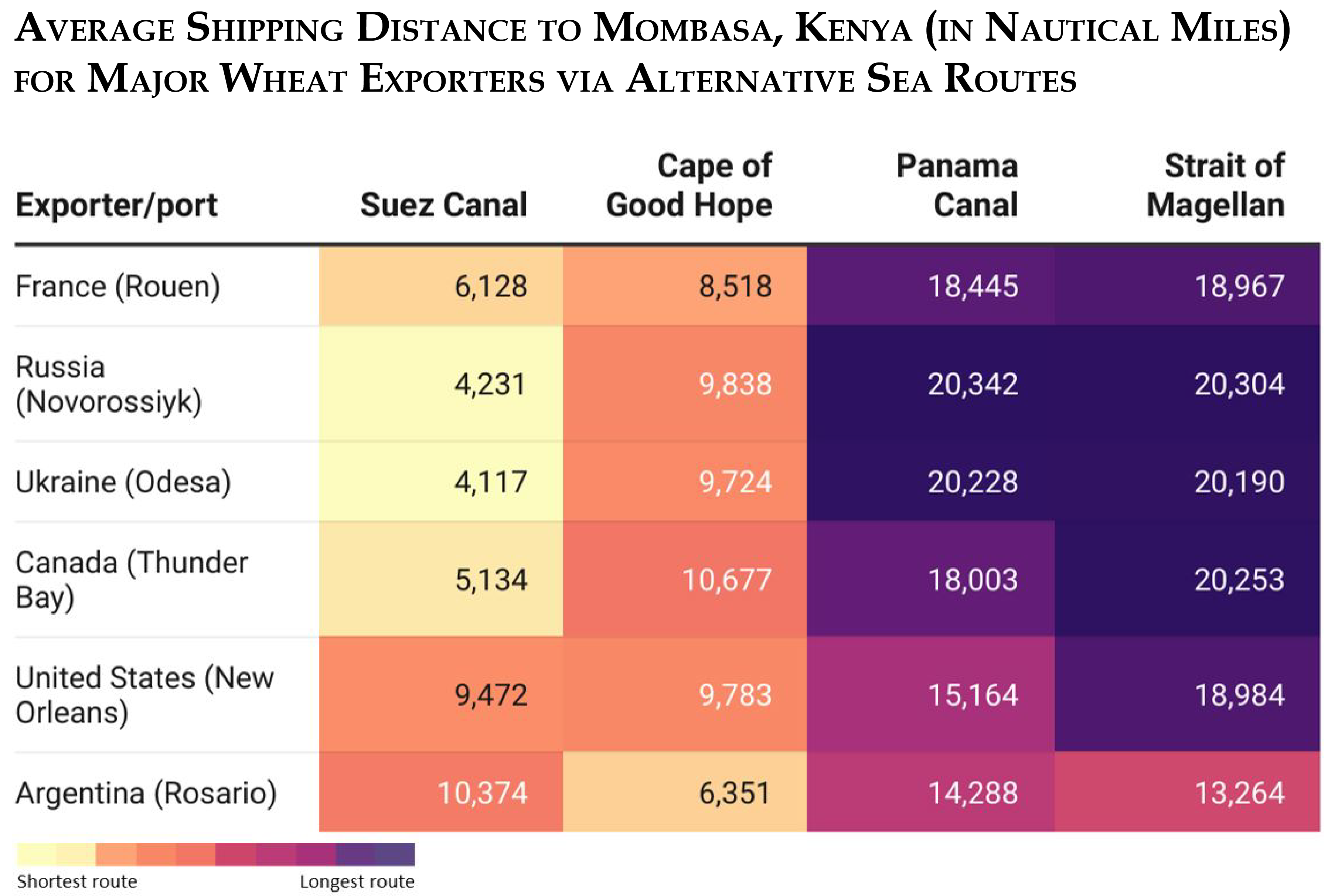
Source: IFPRI
Africa’s Limited Maritime Security Capabilities
No East African navy is currently capable of mounting anti-piracy operations in their waters. Any naval assets committed to thwart the attacks in the Red and Arabian Seas leave fewer vessels to police African maritime hotspots along the east coast of the continent—including Sudan’s humanitarian crisis, the potential regionalization of Somalia and Ethiopia’s diplomatic row over sea access via Somaliland, and a possible scenario of militant extremists employing Houthi tactics against energy infrastructure off the northern coast of Mozambique.
The spike in maritime incidents in the Red Sea and Indian Ocean are creating space for heightened piracy incidents and illicit trafficking. Diverted shipping around the rest of Africa also creates more targets of piracy elsewhere, particularly where more vessels must sail close to the coast.
Every African country—coastal or landlocked—depends on goods carried by shipping and subsea cable networks.
The Houthis have also demonstrated a robust capacity for ballistic missile, drone, and subsea technological disruption. These deployments flag the proliferation of modern materiel to nonstate armed groups. The increased maritime militarization of nonstate actors and criminal groups poses a direct threat to African assets, infrastructure, and national interests elsewhere on the continent.
The Red Sea maritime crisis has shown how the acts of what may seem a faraway nonstate actor, have impacted global economic dynamics. African governments must consider that the tactics the Houthis are using could be employed elsewhere on the continent and, thus, be prepared to safeguard their maritime and economic interests.
The Red Sea crisis has underscored the importance of redundancy. Every African country—coastal or landlocked—depends on goods carried by shipping and subsea cable networks. Having the ability to reroute telecommunications, for example along the subsea cable networks around South Africa, provides valuable backup. The Cape of Good Hope route thus offers an interim dual alternative for surface and subsurface maritime services for the continent.
The crisis has also highlighted the suboptimal functionality of some African ports, which force ships to wait for prolonged periods outside the harbor, making these vessels more attractive targets for piracy or other criminality. Ports that function well, are secure, and located at strategic passes on the shifting shipping routes, stand to benefit. Currently, the majority of Africa’s harbors are struggling to handle the current volume of freight and cope with the security impacts from these delays and late arrivals.
The increased shipping flows around the rest of the continent require a heightened awareness and readiness for off-shore assistance, possible resupply, dependable bunkering services, medical support, and search and rescue certainty. Yet, many countries lack credible maritime policing capabilities. Some have modern naval vessels but these are largely harbor bound, leaving commerce to sail through weakly governed and vulnerable maritime routes.
Strengthening African Maritime Domain Awareness
Maritime domain awareness (MDA) is the basis for extending good order at sea off Africa. There are 5 subregional maritime rescue coordination centers (MRRCs) and 26 subcenters around the continent to cover the entire African coastline for purposes of search and rescue coordination. Two centers began operation in 2022: a Regional Maritime Information Fusion Centre (RMIFC) in Madagascar, providing monitoring and sharing of suspicious vessel activity in the region, and a Regional Centre for Operational Coordination (RCOC) in Seychelles, which uses the information from the RMIFC to coordinate maritime security responses in the Western Indian Ocean (WIO). Though the means for better MDA are in place with the network of MRRCs and the two WIO centers, very little, if any, capacity exists in the African region bordering the Red Sea to help mitigate the range of threats at play—despite the information available and shared.
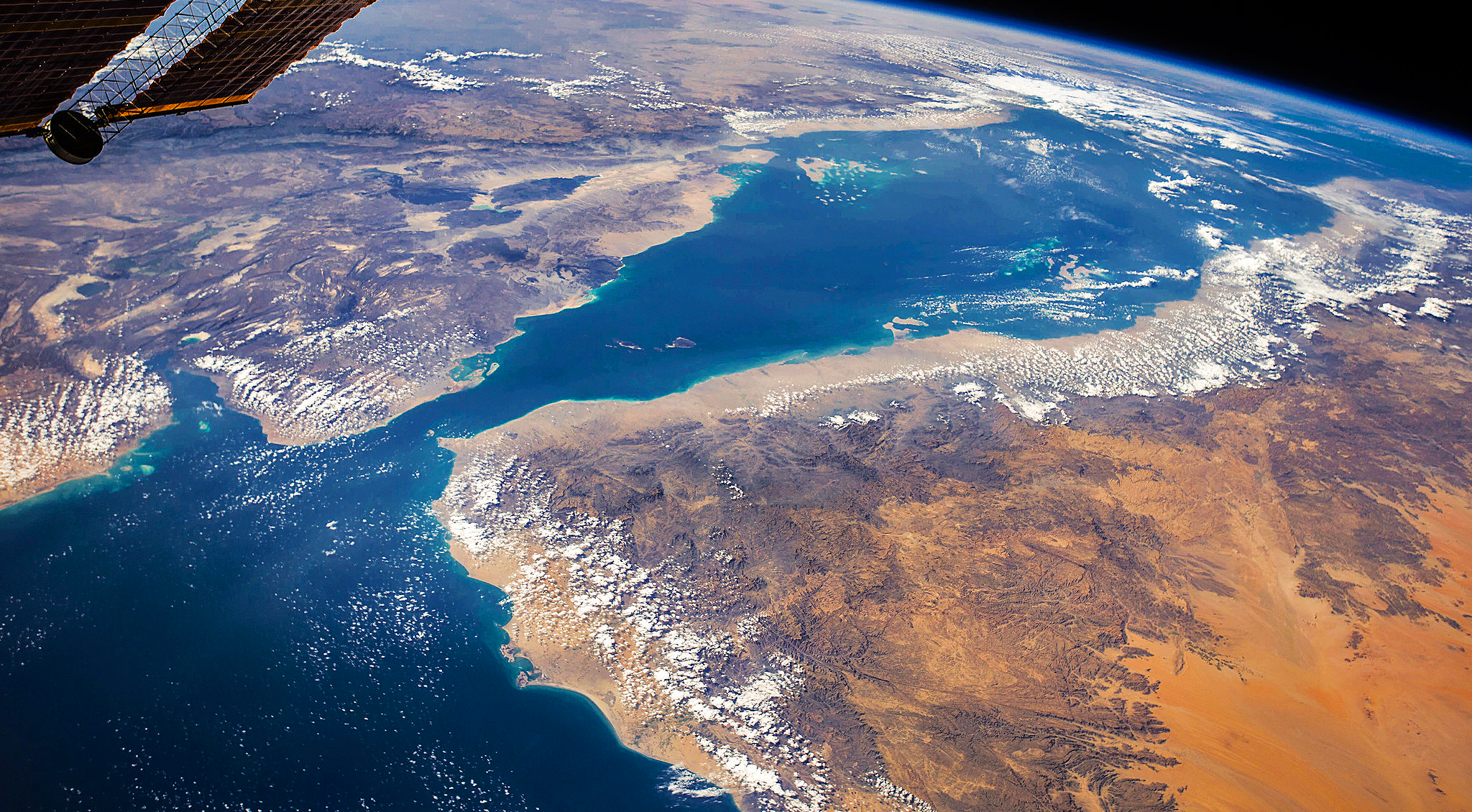
The Red Sea, separating Africa (left) from Yemen (right). (Photo: Riccardo Rossi)
Western navies and the Indian Navy have stepped in to contain the emerging threat landscape through multinational naval responses—including Prosperity Guardian, Operation Aspides (EUNAVFOR), and Operation ATALANTA (anti-piracy). These efforts are vested in maintaining the integrity of the maritime component underpinning the global economy. Yet African navies are conspicuously absent. Not even Egypt, which has a very capable navy and stands to suffer significant economic losses from the crisis, has deployed a single vessel.
As parties to the Law of the Sea (UNCLOS), 47 African countries have a shared responsibility to keep the seas safe from armed interference for free and safe transit in international waterways. Yet, many African governments are seemingly not taking their national maritime interests seriously, ignoring their obligations under UNCLOS and the multiple conventions regulating safe shipping and international cooperation.
At the national level, individual maritime security strategies and programs to promote blue economy opportunities have come under pressure. National policy processes for many African littoral countries have not resulted in enhanced maritime security. Several countries like Ghana, Nigeria, and Kenya, regional bodies like the Intergovernmental Authority on Development (IGAD), and the island states of Seychelles and Mauritius are addressing this matter. For the majority, however, there is a need to extend security beyond Africa’s littoral zones if they are to achieve the maritime ambitions of the African Union (AU) to develop a sustainable and thriving blue economy through its 2050 AIM Strategy as well as the economic growth and development vision in the AU’s Agenda 2063.
Priorities for Mitigating Maritime Insecurity in Africa
The Red Sea maritime crisis demands a recalibration of African maritime security efforts to help keep the routes of trade open, safeguard undersea communications cables, and protect the rule of law.
Expand the scale and scope of maritime information fusion centers to heighten maritime domain awareness. MIFCs can advance MDA by collecting and analyzing information on maritime-related risks and then share actionable intelligence to policymakers and security practitioners. To make the intelligence more meaningful, Africa needs to scale up the number of MIFCs beyond the existing RMIFC as well as expand the scope of information collected—to include environmental crimes (IUU fishing, toxic waste dumping) and threats from militant nonstate groups. Existing maritime security architecture and lessons from the Somali piracy experience must be incorporated and refined to respond to future Houthi-style threats.
Scale up existing security cooperation structures to respond to maritime crises. Over the past decade, much work has been done to instill knowledge, capacity, cooperation, and skills to deal with maritime threats, such as through the zonal architecture of the Yaoundé Protocol and the information-sharing network of the Djibouti Code of Conduct. This knowledge base must be updated to the harder threats enabled by technologies used in the Houthi aggression. Here dormant structures and protocols must be revived or upscaled. Somalia serves as a fruitful field from which to learn and build on existing knowledge, networks, and capacity building experience. One urgent step is to set up Africa’s own networks to interface and share knowledge on the flows of drone and missile technologies to African militant groups.
Elevate African diplomacy to enhance general protection of trade routes, subsea cable networks, and humanitarian assistance. Every African country depends on the continued and uninterrupted flow of goods and telecommunications networks. The Houthi threat and the cable breaks in the Red Sea demonstrate the vulnerabilities in the maritime domain and the need to bring protection, redundancy, and international cooperation into line.
As parties to the Law of the Sea (UNCLOS), 47 African countries have a shared responsibility to keep the seas safe.
Several matters are at play in this effort. African leaders must be mindful of the growing regional rivalries to establish foreign naval facilities in African waters. At the same time—and remaining in step with African preferences for South-South cooperation—Turkey and India may be potential partners. This includes cooperation with selected multinational corporations to protect and repair subsea cable systems around Africa.
African maritime diplomacy initiatives must now include an explicit maritime cooperative element to move from the popular ministerial declarations and communiqués (and their resultant patchwork of political agreements) to that of actual structure, programs, and operations as ordered ways and means to address African maritime interests.
African countries must make use of their collective voice and put their national maritime security strategies and programs into play to better protect an international good based on common interests and security. African countries have a voice in international organizations such as the United Nations and within the framework of UNCLOS. Africa also has a voice in the International Maritime Organization as well as the International Cable Protection Committee. It must also start using its voice in the intergovernmental BRICS organization to influence members, such as Iran and China, to be more constructive rather than coercive maritime security providers and to engage in cooperative maritime and naval diplomacy.
Collectively, the above are incremental steps toward positioning Africa as an emergent maritime security provider to address rapidly evolving maritime interests.
Francois Vreÿ is Professor Emeritus in the Faculty of Military Science at Stellenbosch University, South Africa, and Research Coordinator for the University’s Security Institute for Governance and Leadership in Africa (SIGLA).
Captain (Navy) Mark Blaine is a retired combat officer with the South African Navy, former senior lecturer for nautical science in the Faculty of Military Science at Stellenbosch University, South Africa, and a researcher for SIGLA.
Additional Resources
- Christian Bueger, “Coordinating and Deconflicting Naval Operations in the Western Indian Ocean,” Commentary, Royal United Services Institute (RUSI), February 9, 2024.
- Agnes Chang, Pablo Robles, and Keith Bradsher, “How Houthi Attacks in the Red Sea Upended Global Shipping,” The New York Times, January 21, 2024.
- Darshana M. Baruah, Nitya Labh, Jessica Greely, “Mapping the Indian Ocean Region,” Working Paper, Carnegie Endowment for International Peace, June 15, 2023.
- Karen Allen, “Drones and Violent Nonstate Actors in Africa,” Spotlight, August 6, 2021.
- Africa Center for Strategic Studies, “Trends in African Maritime Security,” Spotlight, March 15, 2019.
- Africa Center for Strategic Studies, “Innovating Security Solutions on the Seas in the Seychelles,” Spotlight, May 25, 2018.
- Africa Center for Strategic Studies, “National Maritime Security Strategy Development Toolkit,” 2016.
- Adeniyi Adejimi Osinowo, “Combating Piracy in the Gulf of Guinea,” African Security Brief No. 30, Africa Center for Strategic Studies, February 28, 2015.
- Augustus Vogel, “Investing in Science and Technology to Meet Africa’s Maritime Security Challenges,” Africa Security Brief, No. 10, Africa Center for Strategic Studies, February 2011.
- Augustus Vogel, “Navies Versus Coast Guards: Defining the Roles of African Maritime Security Forces,” Africa Security Brief, No. 2, Africa Center for Strategic Studies, December 2009.
More On: Maritime Security


